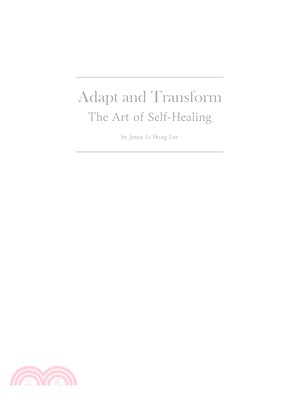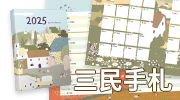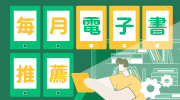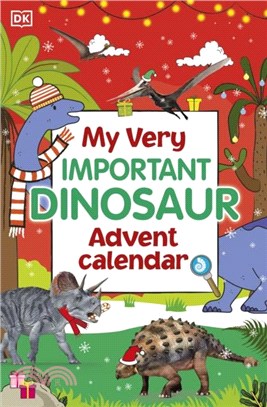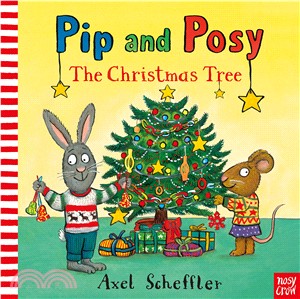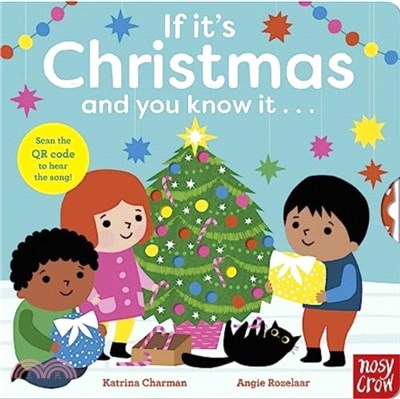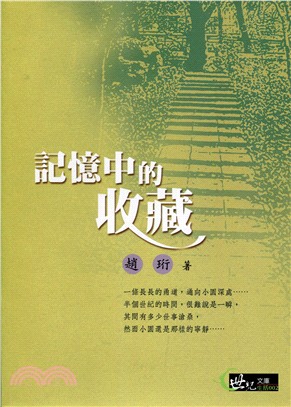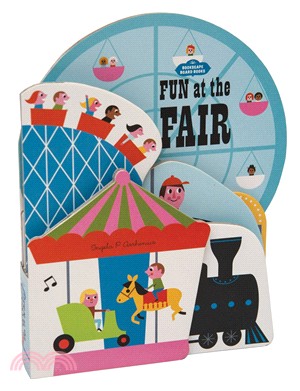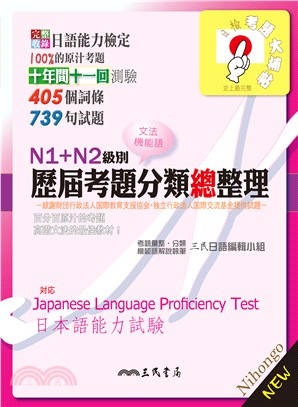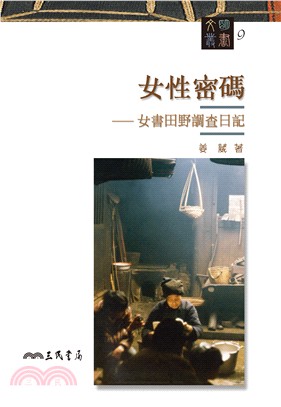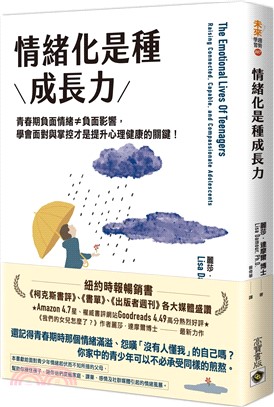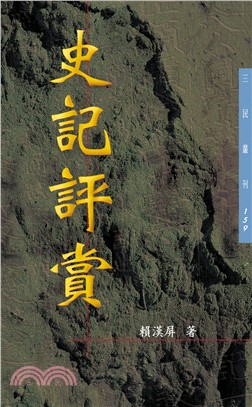Adapt and Transform:The Art of Self-Healing(電子書)
商品資訊
ISBN:9786267056547
EISBN:9786267105009
出版社:白象文化事業有限公司
作者:Jessie Li Hung Lee
出版日:2022/01/01
裝訂:電子書
版次:1版
商品碼:2222220348931
定價
:NT$ 750 元優惠價
:70 折 525 元
閱讀器:書紐電子書
下單可得紅利積點:15 點
商品簡介
作者簡介
名人/編輯推薦
序
目次
書摘/試閱
相關商品
商品簡介
Based on true stories about TCM/ Oriental Medicine and spirituality. You will be astonished at how much TCM can achieve.
◎本書初衷原於作者對她孩子們講述針灸原理,最終以說故事方式呈現中醫療癒身心的臨床經驗,作者很清楚我們都擁有與生俱來的自癒能力。如何保持整體健康是個人的責任。
The book originated from the author’s intention to introduce the principle of acupuncture to her children. In describing the true stories of clinical experiences of healing the body and mind by practicing TCM, it becomes clear to the author that we all possess innate healing power within. How to retain holistic health is a personal responsibility.
◎生老病死,面對生命常態,我們不斷學會覺察、適應與轉變,縱有片刻黑暗苦難,生命依舊自然優雅。
You will learn to adapt and transform while observing the natural cycle of life - Birth, aging, sickness, and death so that you may live in elegance even through darkness and suffering.
◎書中不僅包含中醫傳統的針灸、刮痧、拔罐等臨床療癒故事外,進而闡述宇宙氣候醫學、能量醫學與靈性療癒等多樣化的自我療癒真實故事。
This book also contains true stories about clinical cases of TCM healing methods such as acupuncture, moxibustion, scraping, cupping, and many of self-healing using energy and spiritual healing techniques.
◎代理經銷:白象文化
更多精彩內容請見
http://www.pressstore.com.tw/freereading/9786267056547.pdf
◎本書初衷原於作者對她孩子們講述針灸原理,最終以說故事方式呈現中醫療癒身心的臨床經驗,作者很清楚我們都擁有與生俱來的自癒能力。如何保持整體健康是個人的責任。
The book originated from the author’s intention to introduce the principle of acupuncture to her children. In describing the true stories of clinical experiences of healing the body and mind by practicing TCM, it becomes clear to the author that we all possess innate healing power within. How to retain holistic health is a personal responsibility.
◎生老病死,面對生命常態,我們不斷學會覺察、適應與轉變,縱有片刻黑暗苦難,生命依舊自然優雅。
You will learn to adapt and transform while observing the natural cycle of life - Birth, aging, sickness, and death so that you may live in elegance even through darkness and suffering.
◎書中不僅包含中醫傳統的針灸、刮痧、拔罐等臨床療癒故事外,進而闡述宇宙氣候醫學、能量醫學與靈性療癒等多樣化的自我療癒真實故事。
This book also contains true stories about clinical cases of TCM healing methods such as acupuncture, moxibustion, scraping, cupping, and many of self-healing using energy and spiritual healing techniques.
◎代理經銷:白象文化
更多精彩內容請見
http://www.pressstore.com.tw/freereading/9786267056547.pdf
作者簡介
Dr. Jessie Li Hung Lee was born in Taiwan and immigrated to South America after elementary school. She went on to live in Bolivia, Guatemala, and Mexico before coming to the USA.
Before becoming a TCM doctor, she worked as an architecture and urban designer, school art teacher, educator and school principal.
Dr. Lee shares her father's and sisters' passion for acupuncture and strives to become a healer for her patients, family, friends and herself.
She obtained her Oriental Medicine Master's degree in 2014, Doctorate in 2017, and NCCAOM in 2019. Dr. Lee is currently practicing OM/TCM in her California clinic, always striving to teach her patients self-healing arts.
Like a chameleon, she constantly adapts to changes and continues transforming and uplifting herself to be a better person.
Before becoming a TCM doctor, she worked as an architecture and urban designer, school art teacher, educator and school principal.
Dr. Lee shares her father's and sisters' passion for acupuncture and strives to become a healer for her patients, family, friends and herself.
She obtained her Oriental Medicine Master's degree in 2014, Doctorate in 2017, and NCCAOM in 2019. Dr. Lee is currently practicing OM/TCM in her California clinic, always striving to teach her patients self-healing arts.
Like a chameleon, she constantly adapts to changes and continues transforming and uplifting herself to be a better person.
名人/編輯推薦
PREFACE – ADAPT AND TRANSFORM BY DR. JESSIE LEE
For me, acupuncture began as an act of desperation. I was in pain from spinal stenosis, a displaced vertebra and an arthritic back. This condition had progressed to the point where the steroid shots I had been taking were no longer effective.
This is where Dr. Jessie Lee entered my life. My medical doctor pain specialist recommended acupuncture and Dr. Lee’s treatment, through holistic therapeutic acupuncture technique, was not only helpful, but the acupuncture experience itself was educational as well. Dr. Lee is an excellent teacher. She carefully explained how acupuncture treats the person rather than the disease. The focus of acupuncture is the energy flow in the body. When people experience pain, whether acute or chronic, there is a blockage in a pathway of the body which affects the energy flow to the site of the pain. In the same way, acupuncture serves to redirect energy to a diseased area of the body and relieve the effects of a physical reaction in the body such as a stroke or heart attack.
Adapt and Transform is a fascinating book. It is filled with informative illustrations of acupressure techniques, acupuncture site locations and descriptive Traditional Chinese Medicine theories and therapies. While the focus is on acupuncture and Traditional Chinese Medicine, the book does not discount Western medicine as Dr. Lee herself mentions her regular exams by Western medicine practitioners.
A most delightful aspect of Adapt and Transform is the biographical portrayal of Dr. Lee’s journey and personal transformation while adapting to life across three continents and five countries in Asia (Taiwan), South America (Bolivia) and North America (Guatemala, Mexico, USA). As we share this journey, we witness Dr. Lee’s evolution as a healer. She takes us back to her childhood where she cured a newborn ailing puppy by channeling and resonating energy and carries us to her current practice where she combines acupuncture, hypnosis and psychology in a holistic approach to the treatment of disease and physical ailments.
Dr. Lee’s life journey, as told through vignettes of her personal experiences, paints a broader picture on holistic therapeutic techniques. How she decided to combine various methodologies in her practice can be the subject of another book in and of itself. This determination was formed, in part, by her extrasensory perception attributes.
In the chapter titled “Walking Lightbulb,” Dr. Lee describes how at age 5, she witnessed varying hues of light auras emanating from people. Growing up in rural Taiwan, where her father was a Christian church pastor with acupuncture skills, Dr. Lee was accustomed to seeing sick people visit her father for help. As the thesis research topic for her doctorate in Traditional Chinese Medicine, Dr. Lee chose “light acupuncture modality.” Applying this modality in her practice, Dr. Lee occasionally experienced “inadvertent flashes” of the “walking lightbulbs” and sick people emitting a “faint gray light” instead of the eye-catching “light yellow glow.”
The book is sprinkled with principles of Traditional Chinese Medicine. In several of her biographical sketches, we witness how Dr. Lee’s 15-year struggle with the depression guided her transition from reliance on Western medicine antidepressants to Chinese herbal medicine. From the perspective of Traditional Chinese Medicine, Dr. Lee was able to conclude that “ an unbalanced Heart meridian and organ are the main reasons that caused depression and other mental disorders. (Because the heart controls our mind and spirit, and mainly the emotion of joy) And then, combined secondary meridians and organs unbalanced, such as the Spleen/ Stomach system.” Integral to many treatments in Traditional Chinese Medicine is an overarching spiritual component. This is a component fully embraced by Dr. Lee and her spirituality is reflected throughout the book.
Some concepts of Traditional Chinese Medicine will leave the reader questioning the basic assumptions of Western medicine. Dr. Lee provides an example of a patient, a retired nurse, who was receiving acupuncture for swelling in her ankles related to a past automobile accident. The patient initially balked when Dr. Lee recommended a daily 20-minute soaking of her feet in warm water in addition to the acupuncture treatments. “But why? We only use ice,” was the response of the patient. Dr. Lee noted that if ice had worked in the long-term for the patient before, she would not be undergoing acupuncture treatments now. Because it restricts blood flow, ice temporarily reduces swelling and numbs pain. Noting the teachings of Chinese medicine, Dr. Lee patiently explained that the body naturally maintains a warm temperature range and “warm water keeps our metabolism, digestion all of our circulatory systems functioning.”
For the Westerner, this is a book that opens an easy bridge to acupuncture and other concepts of Traditional Chinese Medicine. Dr. Lee provides an example where she used auricular treatment, the placement of seeds, such as vegetable seeds, in the ear to successfully help a patient manage her pain and quit smoking. By her own example, Dr. Lee demonstrated another dimension of Traditional Chinese Medicine. When she was in her mid-twenties, Dr. Lee became a vegetarian in response to allergies she experienced after eating seafood, meat or chicken. A little over twenty years later, she learned from further allergic reactions to her vegetarian diet, and lessons from her Traditional Chinese Medicine instructors, that she had to balance her nutrition by adding very small amounts of meat and seafood to her diet.
Balance, the Yin and Yang, and introspection, seeking the Divine, are the hallmarks of Dr. Lee’s journey. The goal is to achieve “unity of man and the universe.” Adapt and Transform tells the story of Dr. Lee’s evolution to the person she is today. This book is a treasure for those seeking an easy introduction to acupuncture and Traditional Chinese Medicine. Readers will also receive a bonus as they share Dr. Lee’s life story and her continuing efforts to bring healing, peace and calm to a patient population ailing from a life of imbalance. Thank you Dr. Lee for sharing your knowledge and your empowering life story.
Adrian K. Panton, Attorney
Oct.25.2020 In California
For me, acupuncture began as an act of desperation. I was in pain from spinal stenosis, a displaced vertebra and an arthritic back. This condition had progressed to the point where the steroid shots I had been taking were no longer effective.
This is where Dr. Jessie Lee entered my life. My medical doctor pain specialist recommended acupuncture and Dr. Lee’s treatment, through holistic therapeutic acupuncture technique, was not only helpful, but the acupuncture experience itself was educational as well. Dr. Lee is an excellent teacher. She carefully explained how acupuncture treats the person rather than the disease. The focus of acupuncture is the energy flow in the body. When people experience pain, whether acute or chronic, there is a blockage in a pathway of the body which affects the energy flow to the site of the pain. In the same way, acupuncture serves to redirect energy to a diseased area of the body and relieve the effects of a physical reaction in the body such as a stroke or heart attack.
Adapt and Transform is a fascinating book. It is filled with informative illustrations of acupressure techniques, acupuncture site locations and descriptive Traditional Chinese Medicine theories and therapies. While the focus is on acupuncture and Traditional Chinese Medicine, the book does not discount Western medicine as Dr. Lee herself mentions her regular exams by Western medicine practitioners.
A most delightful aspect of Adapt and Transform is the biographical portrayal of Dr. Lee’s journey and personal transformation while adapting to life across three continents and five countries in Asia (Taiwan), South America (Bolivia) and North America (Guatemala, Mexico, USA). As we share this journey, we witness Dr. Lee’s evolution as a healer. She takes us back to her childhood where she cured a newborn ailing puppy by channeling and resonating energy and carries us to her current practice where she combines acupuncture, hypnosis and psychology in a holistic approach to the treatment of disease and physical ailments.
Dr. Lee’s life journey, as told through vignettes of her personal experiences, paints a broader picture on holistic therapeutic techniques. How she decided to combine various methodologies in her practice can be the subject of another book in and of itself. This determination was formed, in part, by her extrasensory perception attributes.
In the chapter titled “Walking Lightbulb,” Dr. Lee describes how at age 5, she witnessed varying hues of light auras emanating from people. Growing up in rural Taiwan, where her father was a Christian church pastor with acupuncture skills, Dr. Lee was accustomed to seeing sick people visit her father for help. As the thesis research topic for her doctorate in Traditional Chinese Medicine, Dr. Lee chose “light acupuncture modality.” Applying this modality in her practice, Dr. Lee occasionally experienced “inadvertent flashes” of the “walking lightbulbs” and sick people emitting a “faint gray light” instead of the eye-catching “light yellow glow.”
The book is sprinkled with principles of Traditional Chinese Medicine. In several of her biographical sketches, we witness how Dr. Lee’s 15-year struggle with the depression guided her transition from reliance on Western medicine antidepressants to Chinese herbal medicine. From the perspective of Traditional Chinese Medicine, Dr. Lee was able to conclude that “ an unbalanced Heart meridian and organ are the main reasons that caused depression and other mental disorders. (Because the heart controls our mind and spirit, and mainly the emotion of joy) And then, combined secondary meridians and organs unbalanced, such as the Spleen/ Stomach system.” Integral to many treatments in Traditional Chinese Medicine is an overarching spiritual component. This is a component fully embraced by Dr. Lee and her spirituality is reflected throughout the book.
Some concepts of Traditional Chinese Medicine will leave the reader questioning the basic assumptions of Western medicine. Dr. Lee provides an example of a patient, a retired nurse, who was receiving acupuncture for swelling in her ankles related to a past automobile accident. The patient initially balked when Dr. Lee recommended a daily 20-minute soaking of her feet in warm water in addition to the acupuncture treatments. “But why? We only use ice,” was the response of the patient. Dr. Lee noted that if ice had worked in the long-term for the patient before, she would not be undergoing acupuncture treatments now. Because it restricts blood flow, ice temporarily reduces swelling and numbs pain. Noting the teachings of Chinese medicine, Dr. Lee patiently explained that the body naturally maintains a warm temperature range and “warm water keeps our metabolism, digestion all of our circulatory systems functioning.”
For the Westerner, this is a book that opens an easy bridge to acupuncture and other concepts of Traditional Chinese Medicine. Dr. Lee provides an example where she used auricular treatment, the placement of seeds, such as vegetable seeds, in the ear to successfully help a patient manage her pain and quit smoking. By her own example, Dr. Lee demonstrated another dimension of Traditional Chinese Medicine. When she was in her mid-twenties, Dr. Lee became a vegetarian in response to allergies she experienced after eating seafood, meat or chicken. A little over twenty years later, she learned from further allergic reactions to her vegetarian diet, and lessons from her Traditional Chinese Medicine instructors, that she had to balance her nutrition by adding very small amounts of meat and seafood to her diet.
Balance, the Yin and Yang, and introspection, seeking the Divine, are the hallmarks of Dr. Lee’s journey. The goal is to achieve “unity of man and the universe.” Adapt and Transform tells the story of Dr. Lee’s evolution to the person she is today. This book is a treasure for those seeking an easy introduction to acupuncture and Traditional Chinese Medicine. Readers will also receive a bonus as they share Dr. Lee’s life story and her continuing efforts to bring healing, peace and calm to a patient population ailing from a life of imbalance. Thank you Dr. Lee for sharing your knowledge and your empowering life story.
Adrian K. Panton, Attorney
Oct.25.2020 In California
序
Birth, Fading, Sickness, Death & Revival
A little girl asked her master,
“I have a doggy, and this doggy died, so I don’t know how not to be sad?”
Master replied, “You look into the sky, and you see a beautiful cloud, the cloud has become the rain, and when you drink your tea, you can see your cloud in your tea.”
- “Walk With Me” by Thich Nhat Hanh
When I looked at a cup of tea, I said, “Hi cloud!”
Now when I hold onto acupuncture needles, I say, “Hi, Dad!”
- Dr. Jessie Lee
A little girl asked her master,
“I have a doggy, and this doggy died, so I don’t know how not to be sad?”
Master replied, “You look into the sky, and you see a beautiful cloud, the cloud has become the rain, and when you drink your tea, you can see your cloud in your tea.”
- “Walk With Me” by Thich Nhat Hanh
When I looked at a cup of tea, I said, “Hi cloud!”
Now when I hold onto acupuncture needles, I say, “Hi, Dad!”
- Dr. Jessie Lee
目次
Contents
Preface
Prologue
Childhood Journey
A kid’s Question
Needles
Touch For Healing
Walking Light Bulb
Diving Board & Diarrhea
A knee & a Sack of Lemons
Exotic Healing Journey
Malaria
Postpartum Depression
Ant & the Milky Way
Lying On a Cloud
Acupuncture Practitioner Journey
Again, Headache
Every Cloud Has a Silver Lining
The Younger, the Active. The Older, the Wiser
Antennas On the Head
Hey, Is That Abuse?
Pepperoni Mark, Cupping, Healing
I Will Fix You
Neck
It’s Moxa, Not Marijuana
Magic Holographic Therapy
Infant Care
Acupuncture Practitioner Journey
Why Warm
Exercise Healing-Life Energy Flow
Sleep Healing & Twelve Circadian Cycle
16/8 Intermittent Fasting
Diet & Body Types
Energy Healing Journey
Seeing Things From the Top Down
Wind Invasion
Same Virus but Variable Symptoms
Four Seasons & Twenty-Four Seasons
Cosmic Medicine, Sixty Animals
Into Energy Medicine
Natural Healing Journey
Spirit Medicine
Crystal Healing
Light Therapy
Clearing & Resetting
The Next Step
Oneness & Wholeness
Everything Can Be a Healing Remedy
Preface
Prologue
Childhood Journey
A kid’s Question
Needles
Touch For Healing
Walking Light Bulb
Diving Board & Diarrhea
A knee & a Sack of Lemons
Exotic Healing Journey
Malaria
Postpartum Depression
Ant & the Milky Way
Lying On a Cloud
Acupuncture Practitioner Journey
Again, Headache
Every Cloud Has a Silver Lining
The Younger, the Active. The Older, the Wiser
Antennas On the Head
Hey, Is That Abuse?
Pepperoni Mark, Cupping, Healing
I Will Fix You
Neck
It’s Moxa, Not Marijuana
Magic Holographic Therapy
Infant Care
Acupuncture Practitioner Journey
Why Warm
Exercise Healing-Life Energy Flow
Sleep Healing & Twelve Circadian Cycle
16/8 Intermittent Fasting
Diet & Body Types
Energy Healing Journey
Seeing Things From the Top Down
Wind Invasion
Same Virus but Variable Symptoms
Four Seasons & Twenty-Four Seasons
Cosmic Medicine, Sixty Animals
Into Energy Medicine
Natural Healing Journey
Spirit Medicine
Crystal Healing
Light Therapy
Clearing & Resetting
The Next Step
Oneness & Wholeness
Everything Can Be a Healing Remedy
書摘/試閱
6-A Knee & A Sack of Lemons
Gratitude isn’t about giving and receiving valuable items, but about the heart’s intention and the mind’s thoughts.
Dr. Jessie Lee
~~~~~~~~~~
Because of WWII, my father lost contact with his family due to Taiwan and China’s political tension. My father was sixty years old at the time and hadn’t heard any news from his family for over thirty-one years. He missed them terribly during their lengthy separation. The only way he could contact his family was to send mail from foreign countries. As a result, he moved our family to Bolivia in an attempt to reestablish contact with his family.
When we lived in Bolivia, my father served as an independent part-time pastor for the Chinese church and a full-time businessman to raise our family. We owned a small potato chip factory and had a few Bolivian employees.
It was lovely in South America. I still remember the scent of fresh grain, cows, horses, and the dust rising lazily from the dirt roads, filling the air with a natural scent I’ve always loved. The dust often turned the atmosphere pale yellow, blanketing the city. The sky looked so close it seemed as if one could almost touch it. It felt very different from Taiwan’s hot and humid atmosphere, where the sky appeared high and impossible to reach.
One day, a nineteen-year-old worker from the factory approached my father. Tears were running down his face.
“Can I borrow some money from you?” The young man asked. “My right knee hurt so I went to the doctor, and they told me I needed surgery. If the surgery is unsuccessful, they’d have to cut off my leg! My family can’t afford the surgery. I am scared and I don’t know what to do.”
My father replied, “Why don’t you give acupuncture a try? I can help you for free.” The boy looked surprised and confused. “What is that?” He asked.
“In China, we used acupuncture to treat illnesses and diseases for thousands of years,
including knee pain,” my father explained. “With God’s will, it’s usually effective. Let’s try acupuncture at least eight to ten times to help with your knee. In a month, if the needles don’t help, then I can lend you money for your surgery.”
The young man agreed. I watched my father put needles into not only his knee but also into his elbows, hands, and his back. He’d sometimes combine blood-letting and cupping too. I stood by his side and was always eager to help. My father would assign me simple tasks such as passing him cotton balls, alcohol, and needles. I felt proud that I was his little personal assistant.
My father treated the young man twice a week for five weeks. The young man’s knee healed, and he no longer required surgery.
Later he brought his whole family - his father, mother, and sister to our home. They came bearing a sack of lemons as a gift to show their appreciation for my father’s help. I was surprised at the effectiveness of the needles. Even though I was only in junior
high school at the time, the experience evoked my curiosity towards the tiny stainless steel needles. It left many questions swirling in my head but cemented into my memory the gratitude of the young man and his family - with delicious lemons.
以上內容節錄自《Adapt and Transform ~ The Art of Self-Healing》Jessie Li Hung Lee◎著.白象文化出版
更多精彩內容請見
http://www.pressstore.com.tw/freereading/9786267056547.pdf
Gratitude isn’t about giving and receiving valuable items, but about the heart’s intention and the mind’s thoughts.
Dr. Jessie Lee
~~~~~~~~~~
Because of WWII, my father lost contact with his family due to Taiwan and China’s political tension. My father was sixty years old at the time and hadn’t heard any news from his family for over thirty-one years. He missed them terribly during their lengthy separation. The only way he could contact his family was to send mail from foreign countries. As a result, he moved our family to Bolivia in an attempt to reestablish contact with his family.
When we lived in Bolivia, my father served as an independent part-time pastor for the Chinese church and a full-time businessman to raise our family. We owned a small potato chip factory and had a few Bolivian employees.
It was lovely in South America. I still remember the scent of fresh grain, cows, horses, and the dust rising lazily from the dirt roads, filling the air with a natural scent I’ve always loved. The dust often turned the atmosphere pale yellow, blanketing the city. The sky looked so close it seemed as if one could almost touch it. It felt very different from Taiwan’s hot and humid atmosphere, where the sky appeared high and impossible to reach.
One day, a nineteen-year-old worker from the factory approached my father. Tears were running down his face.
“Can I borrow some money from you?” The young man asked. “My right knee hurt so I went to the doctor, and they told me I needed surgery. If the surgery is unsuccessful, they’d have to cut off my leg! My family can’t afford the surgery. I am scared and I don’t know what to do.”
My father replied, “Why don’t you give acupuncture a try? I can help you for free.” The boy looked surprised and confused. “What is that?” He asked.
“In China, we used acupuncture to treat illnesses and diseases for thousands of years,
including knee pain,” my father explained. “With God’s will, it’s usually effective. Let’s try acupuncture at least eight to ten times to help with your knee. In a month, if the needles don’t help, then I can lend you money for your surgery.”
The young man agreed. I watched my father put needles into not only his knee but also into his elbows, hands, and his back. He’d sometimes combine blood-letting and cupping too. I stood by his side and was always eager to help. My father would assign me simple tasks such as passing him cotton balls, alcohol, and needles. I felt proud that I was his little personal assistant.
My father treated the young man twice a week for five weeks. The young man’s knee healed, and he no longer required surgery.
Later he brought his whole family - his father, mother, and sister to our home. They came bearing a sack of lemons as a gift to show their appreciation for my father’s help. I was surprised at the effectiveness of the needles. Even though I was only in junior
high school at the time, the experience evoked my curiosity towards the tiny stainless steel needles. It left many questions swirling in my head but cemented into my memory the gratitude of the young man and his family - with delicious lemons.
以上內容節錄自《Adapt and Transform ~ The Art of Self-Healing》Jessie Li Hung Lee◎著.白象文化出版
更多精彩內容請見
http://www.pressstore.com.tw/freereading/9786267056547.pdf
主題書展
更多
主題書展
更多書展今日66折
您曾經瀏覽過的商品
購物須知
為了保護您的權益,「三民網路書店」提供會員七日商品鑑賞期(收到商品為起始日)。
若要辦理退貨,請在商品鑑賞期內寄回,且商品必須是全新狀態與完整包裝(商品、附件、發票、隨貨贈品等)否則恕不接受退貨。



